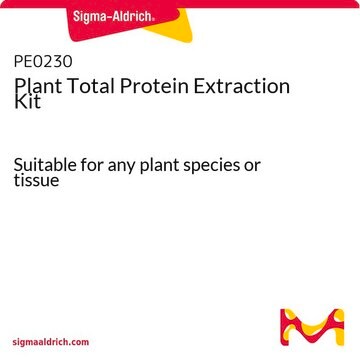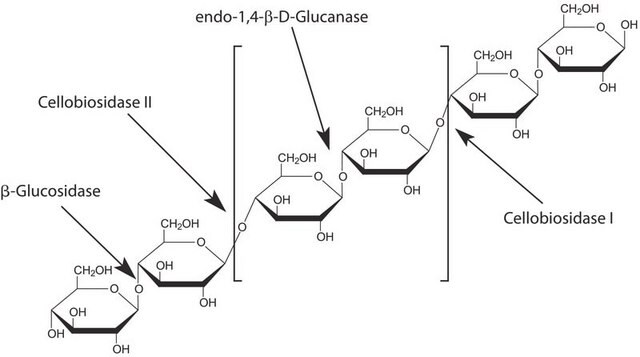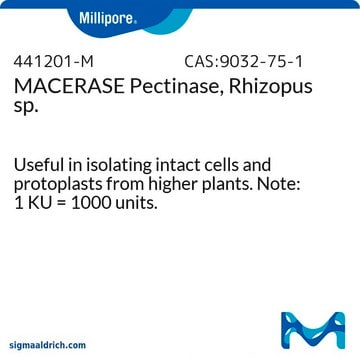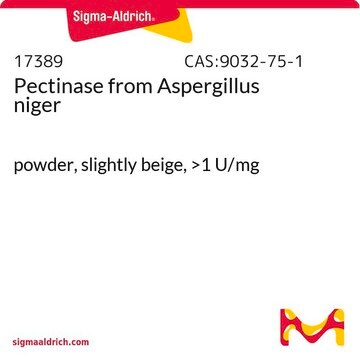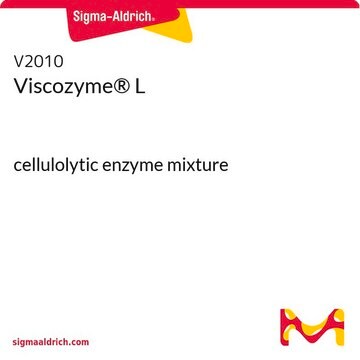D9692
Plant Protoplast Digest/Wash Solution
Rapid isolation of viable protoplasts from plant tissue
Sign Into View Organizational & Contract Pricing
All Photos(1)
About This Item
UNSPSC Code:
41105500
NACRES:
NA.56
Recommended Products
General description
The Plant Protoplast Digest/Wash Solution is formulated to facilitate the rapid isolation of viable protoplasts from plant tissue. Plant cells are surrounded by a rigid, semi-permeable cell wall composed primarily of three classes of polysaccharides: cellulose, hemicellulose, and pectin. The Plant Protoplast Digest/Wash Solution can be used for the digestion of the cell wall after the addition of enzymes that hydrolyze these polysaccharides, such as cellulase, pectinase, or pectolyase. The Plant Protoplast Digest/Wash Solution can be subsequently used to wash away any remaining hydrolytic enzymes after digestion is complete.
Plant protoplasts are typically used for any of a number of downstream applications. These applications include, but are not limited to, transient gene expression, viral transfection assays, somatic hybridization, electrophysiological studies, and morphological studies.
Plant protoplasts are typically used for any of a number of downstream applications. These applications include, but are not limited to, transient gene expression, viral transfection assays, somatic hybridization, electrophysiological studies, and morphological studies.
Storage Class Code
10 - Combustible liquids
WGK
WGK 2
Flash Point(F)
Not applicable
Flash Point(C)
Not applicable
Certificates of Analysis (COA)
Search for Certificates of Analysis (COA) by entering the products Lot/Batch Number. Lot and Batch Numbers can be found on a product’s label following the words ‘Lot’ or ‘Batch’.
Already Own This Product?
Find documentation for the products that you have recently purchased in the Document Library.
Customers Also Viewed
Vera Bandmann et al.
Molecular plant, 4(2), 241-251 (2010-12-08)
To analyze the kinetics and size of single exo- and endocytotic events in BY-2 protoplasts, we employed cell-attached membrane capacitance measurements. These measurements revealed different modes of fusion and fission of single vesicles. In about half of the observed exocytotic
R Ma et al.
Plant cell reports, 22(5), 320-327 (2003-12-04)
A method for somatic embryogenesis and fertile green plant regeneration from suspension cell-derived protoplasts of rye (Secale cereale L. cv. Auvinen) was developed. Fast-growing and friable embryogenic calli with a high regeneration capacity were induced from immature rye inflorescences using
Anna Kärkönen et al.
Methods in molecular biology (Clifton, N.J.), 715, 1-20 (2011-01-12)
Plant tissue cultures are an efficient system to study cell wall biosynthesis in living cells in vivo. Tissue cultures also provide cells and culture medium where enzymes and cell wall polymers can easily be separated for further studies. Tissue cultures
J Sheen
Plant physiology, 127(4), 1466-1475 (2001-12-18)
Plant protoplasts show physiological perceptions and responses to hormones, metabolites, environmental cues, and pathogen-derived elicitors, similar to cell-autonomous responses in intact tissues and plants. The development of defined protoplast transient expression systems for high-throughput screening and systematic characterization of gene
Keisuke Komoda et al.
Proceedings of the National Academy of Sciences of the United States of America, 101(7), 1863-1867 (2004-02-11)
The replication of eukaryotic positive-strand RNA virus genomes occurs through a complex process involving multiple viral and host proteins and intracellular membranes. Here we report a cell-free system that reproduces this process in vitro. This system uses a membrane-containing extract
Our team of scientists has experience in all areas of research including Life Science, Material Science, Chemical Synthesis, Chromatography, Analytical and many others.
Contact Technical Service





